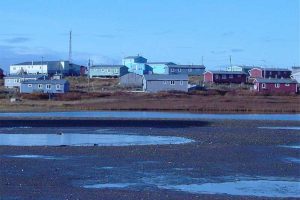Tribal Profiles - Alaska Region
- Tribal Profiles
- Alaska
- Algaaciq Native Village
- ANTHC Assessing Health Impacts and Documenting Observed Changes
- ANTHC Portable Alternative Sanitation System
- Central Council of the Tlingit & Haida Indian Tribes of Alaska
- Norton Bay Inter-Tribal Watershed Council
- Reindeer Herders Association
- Yupik Changes & Observations
- Tribal Profiles
- Alaska
- Algaaciq Native Village
- ANTHC Assessing Health Impacts and Documenting Observed Changes
- ANTHC Portable Alternative Sanitation System
- Central Council of the Tlingit & Haida Indian Tribes of Alaska
- Norton Bay Inter-Tribal Watershed Council
- Reindeer Herders Association
- Yupik Changes & Observations

Tribal Profiles
Alaska Region

Indigenous peoples around the world have been encroached upon for centuries. Alaska and other far north regions have been among the last to be colonized, shielded from invaders by the harsh and extreme environment. Today, Alaska Native society is clashing with outside society in a more passive way, though the impacts on them could be as severe, if not more so. Alaska’s vast landscape is changing at a rapid pace, due in part to climate change. Climate change will impact the world’s entire population; however, Alaskans will be among the first populations to feel the consequences of humanity’s actions.
Rural Alaskans are inextricably bound to the land and sea, depending on the natural world for their survival and interacting with it to sustain their culture and spirituality. If one does not respect what Earth provides and give back regularly to preserve the land for the next seven generations, one does not survive. Parents, grandparents, and extended family instill these cultural values in Native Alaskan youth, teaching them how to hunt, fish, gather and relate to the greater forces, as has been taught through generations in the unforgiving northern Arctic environment.
Today, changing climatic conditions threaten the existence of northern populations. The people who have persevered for centuries, against all odds, must again adapt in order to survive. Although the environmental extremes helped protect Alaska Natives from fates suffered by other indigenous populations, their region now faces a much stronger force: Mother Nature’s rebellion against misuse and mistreatment by humans.
We cannot escape the impacts of climate change; we must now face the consequences and learn to adjust our ways in order to survive.
CONNECT WITH US
Nikki Cooley
Co-Director
Nikki.Cooley@nau.edu
Karen Cozzetto
Manager
Karen.Cozzetto@nau.edu
Your tax deductible donation supports ITEP’s programming efforts.
Please contact us if you would like to contribute to our endowment or for any additional information regarding donations.

